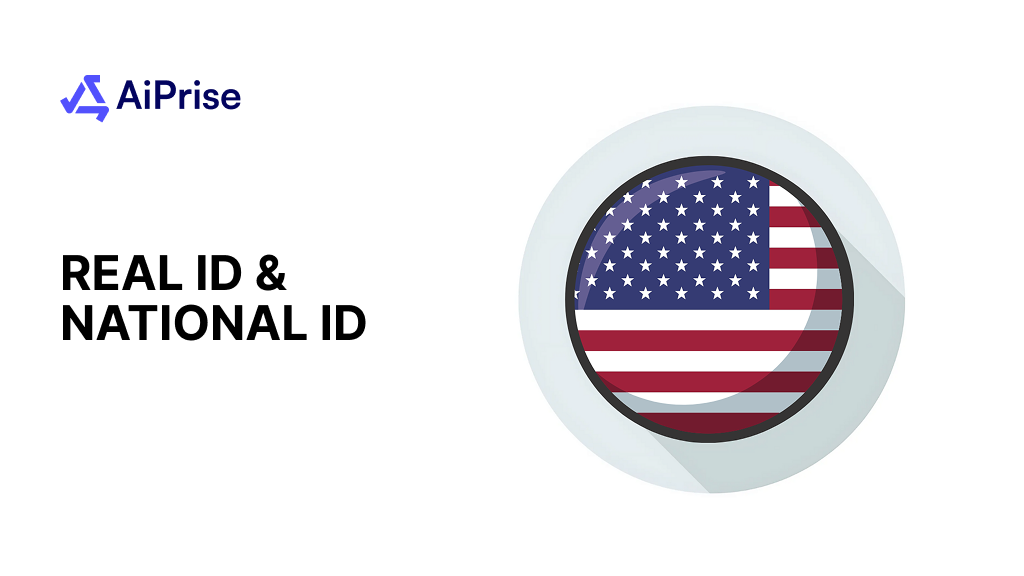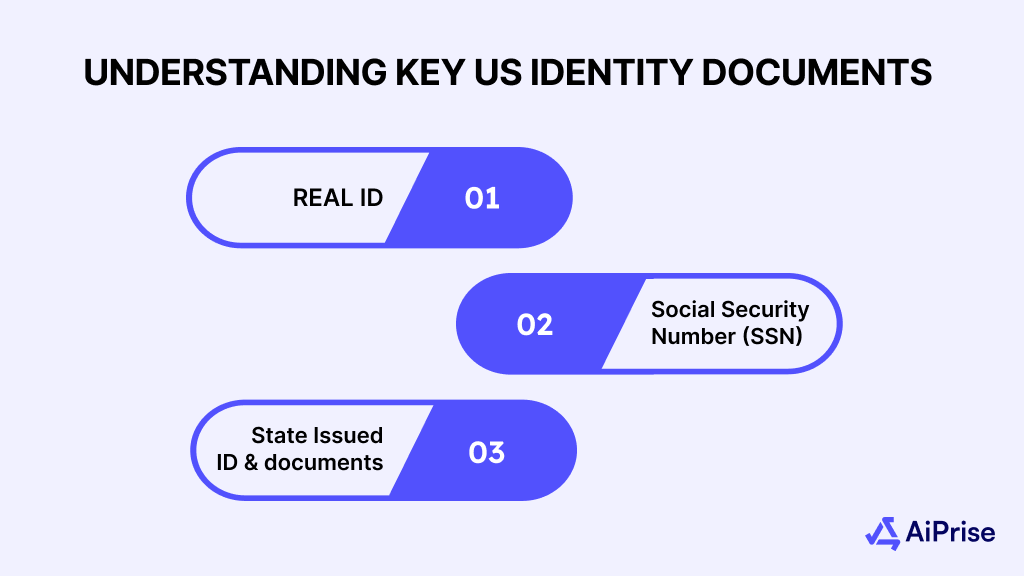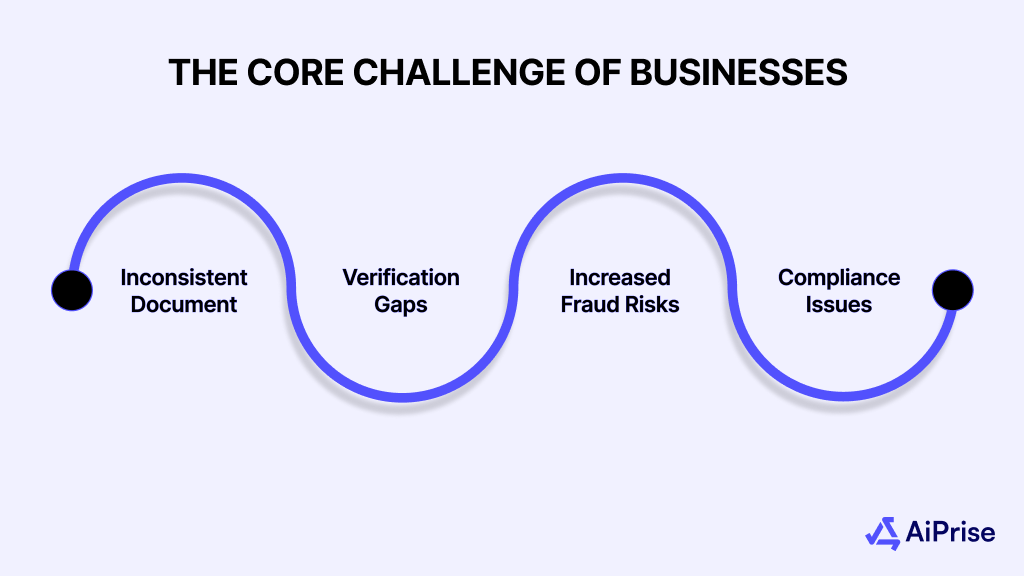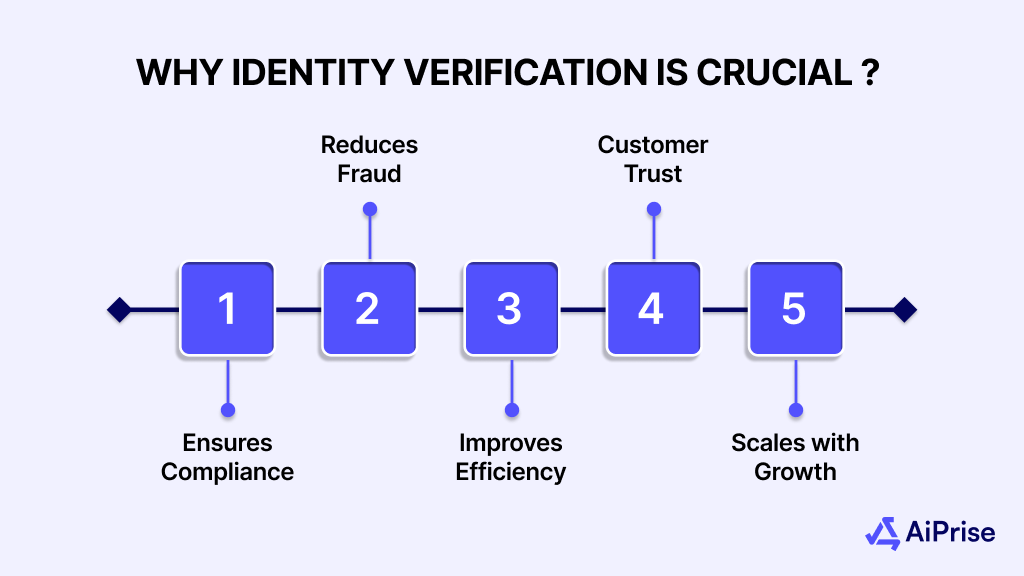AiPrise
10 mins read
July 18, 2025
What is Needed for Real ID: Understanding U.S. Identity Verification and Compliance Challenges

Key Takeaways










A REAL ID is a federally recognized identification card required for specific activities like boarding domestic flights or entering federal buildings.
To get one, you'll need to provide specific documents, including proof of identity, residency, and lawful status. The requirements can vary by state, making it challenging for businesses to verify customer identities consistently.
In this post, we’ll explore what is needed for REAL ID and how AiPrise's platform can help businesses manage these complexities.
Key Takeaways:
- Verifying U.S. customer identities is complicated due to varying state IDs and regulations.
- AiPrise offers real-time verification using data from over 100 sources.
- Customizable onboarding flows meet state-specific compliance needs.
- Advanced fraud detection tools help identify and prevent fraudulent activities.
- Easy integration with existing systems streamlines the verification process.
- AiPrise ensures businesses stay compliant, reduce fraud risks, and improve efficiency.
Understanding Key US Identity Documents

In the U.S., there are several types of identity documents, each serving a different purpose. These documents can vary by state, making it essential to understand their specific requirements and differences to accurately verify customer identities.
Let’s take a closer look at the key identity documents you’ll encounter:
REAL ID
A REAL ID is a driver's license or identification card meeting federal security standards set by the REAL ID Act of 2005. This act responded to a 9/11 Commission recommendation for stronger identification. You can identify a REAL ID by a star (often gold or black) in the upper right corner.
Purpose:
- Beginning May 7, 2025, you will need a REAL ID or another federally accepted ID to board domestic flights.
- You will also need it to enter secure federal facilities, such as military bases and federal courthouses.
Important Note: You are not required to get a REAL ID if you have an alternative, like a U.S. passport, for these purposes.
How to Obtain:
- You must apply in person at your state's Department of Motor Vehicles (DMV).
- Provide documents proving identity, Social Security Number, and residency.
Social Security Number (SSN)
A Social Security Number (SSN) is a unique nine-digit number. The Social Security Administration (SSA) issues it to U.S. citizens, permanent residents, and eligible non-immigrant workers.
Original Purpose: The SSN was initially used to track earnings for Social Security benefits. However, today it is widely used as a universal identifier for the following purposes:
- Employment: Employers use it to report your wages to the government.
- Financial transactions: Banks and credit companies often request your SSN to track financial information.
Security: Protecting your SSN is very important due to its sensitive nature. Criminals can use it for identity theft.
Other State-Issued IDs and Documents
Besides the REAL ID and SSN, other state-issued documents play a role in identification.
Driver's License:
- This is the most commonly issued state photo ID.
- It allows you to operate a motor vehicle.
- It also serves as primary identification for many non-driving purposes, such as opening bank accounts and proving age.
- If your driver's license is not REAL ID compliant, it will say "FEDERAL LIMITS APPLY." You can still use it for driving and other non-federal identification needs.
Non-Driver State Identification Cards:
- These cards serve the same identification functions as a driver's license but do not grant driving privileges.
- They are helpful if you do not drive but need a government-issued photo ID.
Birth Certificate:
- This is an initial identification document.
- It proves your birth date, place, and parentage.
- You generally need a certified copy to obtain other primary IDs, such as a passport or driver's license.
- By itself, a birth certificate usually proves citizenship but not identity, as it lacks a photo.
The Core Challenge of Businesses: Navigating the US Identity Landscape

For U.S. businesses, verifying customer identities is far from straightforward. The sheer variety of state-issued documents, inconsistent standards, and diverse verification requirements create significant complexities, impacting compliance, data management, and escalating fraud risks.
Let’s break down the key challenges businesses face when verifying identities in the U.S.
Inconsistent Document Standards
Different states issue various forms of identification with varying security features and formats. This lack of standardization means businesses must:
- Recognize and verify a wide range of IDs, including enhanced driver’s licenses, REAL IDs, and standard ID cards.
- Understand the different requirements for each state, which complicates the verification process and increases the chances of errors or compliance issues.
Data Silos and Verification Gaps
Many businesses manage customer information across multiple systems, which often leads to:
- Data silos make it difficult to verify identity documents consistently.
- Gaps in customer data can result in inaccurate identity verification.
- Increased difficulty in cross-checking IDs against authoritative sources due to fragmented systems.
Increased Fraud Risks
The variety of identity documents and the lack of uniform verification systems heighten the risk of fraudulent activities. Without secure verification methods, businesses are vulnerable to:
- Identity theft, fake documents, and stolen credentials.
- Financial losses and reputational damage.
- Legal and compliance issues that may arise from accepting fraudulent information.
Compliance Issues
U.S. businesses must adhere to strict Know Your Customer (KYC) and Anti-Money Laundering (AML) regulations. These compliance requirements demand accurate and consistent identity verification.
Here are the key challenges:
- Staying compliant with varying regulations across states and industries.
- Risk of fines and penalties for non-compliance.
- Maintaining customer trust by ensuring their information is verified correctly and securely.
Why Robust Identity Verification Solutions are Indispensable for U.S. Businesses?

With the rising complexity of identity verification in the U.S., having a reliable solution to verify customer identities is no longer optional—it’s a necessity. A robust identity verification solution helps businesses stay compliant, reduce fraud risks, and streamline operations. Here’s why a solid verification system is crucial for U.S. businesses:
- Ensures Compliance: Federal and state regulations require businesses to verify customer identities accurately to prevent fraud and money laundering. A robust solution ensures businesses meet Know Your Customer (KYC) and Anti-Money Laundering (AML) requirements, reducing the risk of legal penalties.
- Reduces Fraud: Identity theft and fraudulent activities are on the rise. A comprehensive verification solution can detect suspicious documents and anomalies in real-time, protecting businesses from potential fraud and minimizing financial losses.
- Improves Efficiency: Manual verification processes are time-consuming and error-prone. Automating identity verification through a robust system allows businesses to process verifications quickly and accurately, improving operational efficiency.
- Maintains Customer Trust: Customers expect secure and reliable identity verification. A solution that ensures their personal information is handled securely helps businesses build trust and loyalty, encouraging long-term relationships.
- Scales with Growth: As businesses expand, managing increasing numbers of customer verifications becomes more challenging. A flexible and scalable identity verification solution can adapt to the growing needs of a business, ensuring smooth operations at every stage of growth.
How AiPrise Powers U.S. Identity Verification
AiPrise provides an identity verification platform that simplifies the complex process of verifying U.S. customer IDs. It offers businesses a reliable and efficient way to ensure compliance with varying state regulations while minimizing fraud risks.
The following are the key features of AiPrise’s platform:
- Comprehensive Verification: AiPrise uses data from over 100 sources to verify identities accurately and in real time. This helps businesses reduce fraud and improve the verification process.
- Customizable Onboarding Flows: The platform allows businesses to create tailored onboarding experiences that meet specific compliance needs across different states.
- Risk-Based Decisioning: AiPrise includes a customizable rule engine that helps businesses set risk thresholds and make decisions based on their unique criteria.
- Advanced Fraud Detection: AiPrise utilizes a variety of data points, including documents and criminal records, to identify potential fraud. Regular checks provide continuous protection.
- Easy Integration: The platform integrates with existing business workflows, reducing the need for manual processes and making identity verification more efficient.
- Global Reach: AiPrise serves businesses in over 200 countries, making it suitable for businesses with global customer bases, helping them verify individuals and businesses across various jurisdictions.
By adopting AiPrise's platform, U.S. businesses can effectively manage the complexities of identity verification, ensuring compliance with varying state regulations and reducing the risks associated with fraud.
Conclusion
Understanding what is needed for REAL ID is crucial for businesses that need to verify customer identities. AiPrise’s platform simplifies this process, ensuring compliance, reducing fraud risks, and improving efficiency. By adopting AiPrise, businesses can manage identity verification more effectively, regardless of the types of IDs their customers present.
Ready to simplify U.S. identity verification and ensure compliance? Book a Demo with AiPrise today!
Frequently Asked Questions (FAQ)
1. What is the difference between a REAL ID and a regular state ID?
A REAL ID is a federally recognized identification that meets higher security standards, required for certain activities like boarding domestic flights and accessing federal buildings. In contrast, a regular state ID may not meet these federal standards and is primarily used for local identification purposes. REAL IDs require more documentation to obtain, such as proof of U.S. citizenship and a Social Security number.
2. How does AiPrise handle multiple state-issued IDs for identity verification?
AiPrise’s platform accounts for the different formats and security features of state-issued IDs. It utilizes advanced algorithms and data from over 100 sources to verify each ID accurately, regardless of the state in which it was issued. This ensures businesses can trust the platform’s ability to verify identities consistently, regardless of regional differences in ID formats.
3. Can AiPrise help businesses comply with both federal and state identity verification requirements?
Yes, AiPrise’s platform is designed to ensure compliance with both federal and state regulations. It offers tools for businesses to meet Know Your Customer (KYC) and Anti-Money Laundering (AML) requirements, regardless of the variations in state-issued IDs. By using real-time data and customizable rules, AiPrise helps businesses stay compliant in diverse regulatory environments.
4. How does AiPrise detect fraudulent identities during verification?
AiPrise uses a comprehensive approach to detect fraud, utilizing data from multiple sources such as documents, judicial and criminal records, email, and device checks. The platform also includes regular, automated checks that help catch suspicious activities early. This multi-layered detection system minimizes the risk of fraudulent identities slipping through.
5. What type of businesses can benefit from AiPrise’s identity verification platform?
Any business that needs to verify customer identities, whether for financial services, e-commerce, healthcare, or any other industry, can benefit from AiPrise’s platform. The platform is especially valuable for businesses dealing with high volumes of identity verification and those that operate across multiple states or globally. It streamlines verification while ensuring compliance and reducing fraud risks.
6. Is AiPrise’s platform suitable for businesses with international customers?
Yes, AiPrise serves businesses in over 200 countries, making it an ideal solution for companies with a global customer base. It provides accurate identity verification for individuals and businesses from different jurisdictions, ensuring that businesses can manage identity verification seamlessly, no matter where their customers are located.
You might want to read these...

AiPrise’s data coverage and AI agents were the deciding factors for us. They’ve made our onboarding 80% faster. It is also a very intuitive platform.





Speed Up Your Compliance by 10x
Automate your compliance processes with AiPrise and focus on growing your business.





